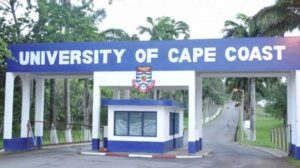JOURNALISM COURSES IN THE UNIVERSITY OF GHANA

Now restructured as the Department of Communication Studies, it was originally established in 1972 as the Institute of Journalism and Mass Communications with the objectives of improving the practice and understanding of journalism and mass communication; adding to knowledge through research; and to serve both practitioners in mass communication and the public who rely on the media. It offered programmes leading to the award of Graduate Diplomas.
In 1974 its name was changed to the School of Journalism and Mass Communication. Then in 1985, it became known as the School of Communication Studies to reflect a wide variety of media-related courses that had been introduced into its curriculum.
In 1998, the Department of Communication Studies converted its Graduate Diploma programme to a direct Master’s programme and currently offers two programmes in Communication Studies, namely, Master of Arts (M.A.) and Master of Philosophy (M.Phil). In addition, the Department supervises a Bachelors programme at the Ghana Institute of Journalism, which is affiliated to the University of Ghana.
The Department has to date graduated close to 1,000 students with Graduate Diplomas, M.A. and M.Phil degrees in Communication Studies. These graduates have made important contributions to development at national and international levels through their professional expertise as Journalists, Public Relations Specialists, Media Managers, Advertising practitioners, Researchers, Development Communication Planners and Specialists, Academics and Practitioners in various other media and communication endeavours.
SCS alumni are found in most important areas of national life: government, public, military, policy and other state institutions; private and non-governmental organizations. Some have also made their mark in UN agencies and programmes, other reputable international organizations and in academia.
As the premier institution offering graduate programmes in communication studies in Ghana, the Department has oversight responsibility over such institutions as the African University College of Communications (AUCC), Christian Service University College (CSUC), Central University and Islamic University, all of which offer communication studies at the first degree levels.
The School of Information and Communication Studies (SICS) aims at improving and extending the frontiers of Information and Communication dissemination and management through effective teaching, learning and research.
The School focuses on developing world-class students who are skilled, versatile, creative and ready to take up positions in local and global information and communication industries. It also aims at producing innovative research to reflect the evolutions in the creation, dissemination and exploitation of knowledge and the impact of new forms of media and communication on people’s lives. Departments.
The School is made up of the Department of Communication Studies and the Department of Information Studies. The Communication Studies Department is considered the leading research and training institution in media and communication studies in the country.
The Department enjoys a high reputation within the country and internationally and engages in collaborative academic programs, projects and research with counterpart institutions in Africa, North America and Europe.
Alumni of the Department can be found in various national, regional and international communication and media related organizations, governmental institutions as well as universities and research institutes.
The Information Studies Department is equally well-regarded nationally and internationally. It is the foremost center for knowledge creation and transfer in the fields of librarianship, archives and records management, information science and digital humanities in Ghana.
Initially established in 1961 as the Ghana Library School, the Department has expanded its programs to reflect the interdisciplinary nature of information studies in today’s world. The programs offered by these two departments – Communication Studies and Information Studies – are especially vital in an age when information and communication technologies are rapidly evolving and transforming how people receive, retrieve and use information in all aspects of their lives.
Both departments have a strong track record of working with the information management, cultural heritage, media and communication industries in Ghana and contributing to these fields through faculty extension work.
In the coming years we at the School of Information and Communication Studies aim to continue to create strong collaborations with industry and to seek new opportunities for our research and teaching in order to increase the impact we have on our students, in our communities and the world around us.
The School is offering :
| COMS 608: ADVANCED BROADCAST JOURNALISMThis course focuses on the writing and production of broadcast messages. Aspects covered range from news stories through public service announcements to commercials. Students are led to examine persuasion as a common element of all broadcast… | COMS 607: PRINT JOURNALISMThis course introduces students to the basics of journalism and its practice. It is designed to provide students with a general knowledge and understanding of news writing and reporting. Emphasis is on techniques of writing and gathering information… |
| COMS 606: ADVANCED PRINT JOURNALISMThe main objective of this course is to assist students to improve upon their writing skills and introduce them to various approaches to Journalism. Students are taught interpretative and investigative reporting skills through covering major beats… | COMS 605: COMMUNICATION RESEARCH METHODSThe course focuses on the basics of “scientific” communication research. Students are introduced to the philosophy, the logic and rules of empirical research. There is a limited introduction to the use of statistics in communication… |
| COMS 604: QUANTITATIVE AND QUALITATIVE ANALYSESThe course is aimed at familiarising students with the basic techniques for analysing results of social research with particular emphasis on communication issues. The focus of the course is on the research design process: conceptualisation and… | COMS 603: MASS MEDIA, CULTURE AND SOCIETYStudents are introduced to basic concepts in Mass Communication, particularly its elements and processes, institutional structures and characteristics. The course also explores the socio-cultural and philosophical context of media institutions and… |
| COMS 602: DEVELOPMENT COMMUNICATIONThis is a graduate seminar course that analyses the relationship between communication and development, especially in countries classified as “less developed” or Third World. The seminar reviews the historical development of the concept… | COMS 601: COMMUNICATION THEORIES & MODELSThe course is intended to offer a broad overview of a core of theories related to communicative behaviour, particularly mass communication. Empirical research in mass communication, including the development of theories, will be used to explain and |




